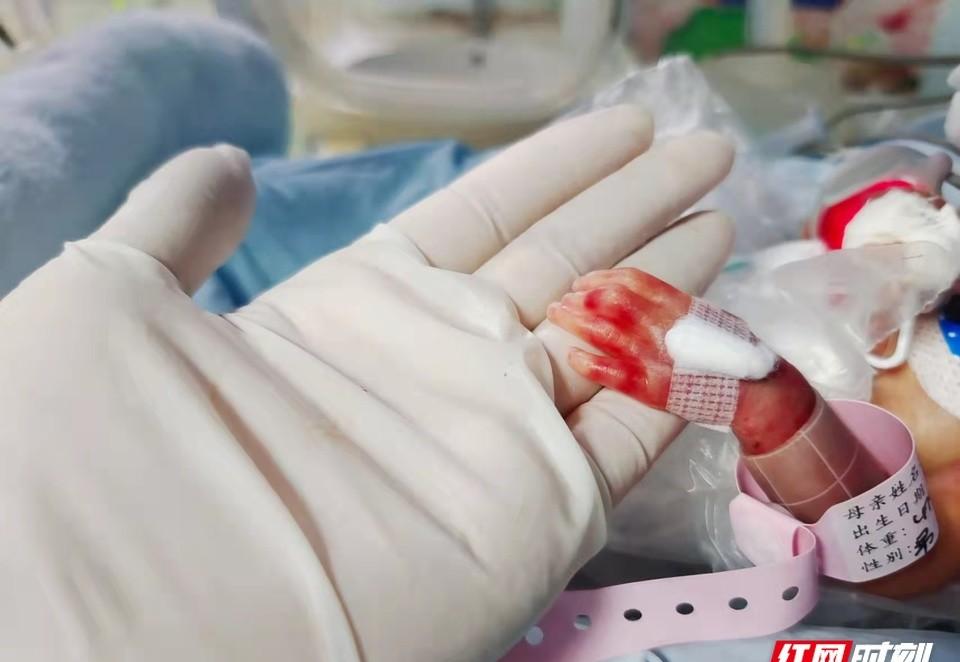
In the evening of the Chinese New Year's Eve, the NICU team of Hengyang Maternal and Child Health Hospital went all out to treat 470 grams of ultra-premature babies.
Medical staff stuck to their posts and went all out to rescue and treat them.
Red Net Moment Hengyang, January 27 (Correspondent Lei Linchen Reporter Tan Qian) On the evening of January 26, in this small Chinese New Year's Eve of reunion, it was a thousand guns for the medical staff of the neonatal intensive care unit (NICU) of Hengyang Maternal and Child Health Hospital. On the same day, an ultra-premature infant with a gestational age of only 24 weeks and a weight of about 470 g continued to drop to 20% due to complications such as pulmonary hemorrhage, active intracranial hemorrhage, severe anemia, shock, and severe acid replacement under the condition of 100% oxygen high-frequency invasive ventilator ventilation. Although the treatment is not large, but in the face of fresh life, Xie Feiyan, the chief physician of the hospital, with a tenacity of "not giving up, not abandoning", led the NICU team, day and night, and made every effort to rescue, finally, the child's blood oxygen was finally gradually increased to more than 90%, and his life was temporarily reduced to a disaster.
On January 24, Ms. Li (pseudonym), 36, gave birth to a 470g ultra-premature baby boy at the Hengyang Maternal and Child Health Hospital. However, because the gestational age is only 24 weeks, the baby boy's body is only the size of an adult's palm, many organs of the body are not fully developed, the whole body is almost transparent bruises, there is no spontaneous breathing, the heartbeat is very weak, and after suffocation and resuscitation, it is transferred to the NICU ward. The child is diagnosed with: ultra-preterm infants, ultra-low weight infants, sepsis, coagulation dysfunction, neonatal asphyxia, etc., and their lives are in danger, and they are treated with invasive ventilators such as endotracheal intubation.
Xie Feiyan introduced that premature infants have immature tissues and organs, poor adaptability to the outside world, are prone to various complications, and have a high mortality rate, and the risk of serious disability of survivors is also high. What is more critical is that this ultra-premature baby with a gestational age of only 24 weeks, the blood vessels are as thin as hair, the coagulation function is also particularly poor, and the slight operation action may be red, swollen and bleeding, so the difficulty of treatment is much more difficult than that of the average premature baby, and this child is currently the smallest pregnant and the smallest ultra-preterm baby in Hengyang.
"This is the third time that Ms. Li has been fertilized through IVF, and the previous two pregnancies have not been able to save the child." Therefore, this child is very important to Ms. Li. Xie Feiyan said frankly that whenever she saw the family of the child worried about the safety of the child with tears in her eyes, she and the team were very unbearable, facing the difficulties of treatment, they did not hesitate, and their whole thought was how to help this hard-won child win life.
Since the birth of the child, the nursing staff of the neonatal intensive care unit has been accompanying him, giving a series of symptomatic treatment and care such as warmth, anti-infection, hemostasis, effective ventilation and stability of the internal environment. Considering that the child is an ultra-premature baby and an ultra-low birth weight baby, the development of various organs throughout the body is extremely immature and the resistance is extremely poor, the department has prepared a special isolation ward to protect it and provide special care. On January 26, at 20:00 p.m. in the Chinese New Year's Eve, the child's condition changed again, so the first-line, second-line, and third-line physicians and nurses on duty of the department all stuck to their posts, expanding capacity, correcting acid, stopping bleeding, transfusion, and effective cardiopulmonary resuscitation to ensure effective ventilation and stable internal environment, and adjusting ventilator parameters at any time in time in order to improve blood oxygen saturation. Every link is cautious, precise and strict, in the team's unremitting 2 hours of hard work, the child's blood oxygen saturation and blood pressure finally increased, blood oxygen reached more than 90, blood pressure rose to maintain normal.
After this emergency rescue, the child's condition gradually stabilized. However, this is only the first of the life-and-death barriers that children need to overcome. After that, the child will also face multiple problems such as breathing, intracranial hemorrhage, nutrition, infection, and internal environmental disorders. Xie Feiyan said that the medical team of the department will continue to go all out to accurately treat and carefully care for premature babies to survive the test of life and death.